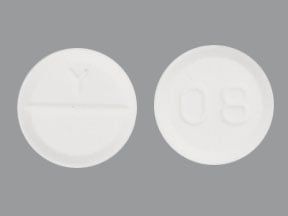
Robinul Coupons & Savings Card – Discount Prices from $8.69
Brand for: Glycopyrrolate
My prescription
Edit
1MG, Glycopyrrolate (60 Tablets)
Select pharmacy

CVS
$21.80
COUPON PRICE
Walmart
$8.69
COUPON PRICE
Walgreens
$15.30
COUPON PRICE
Albertsons
$19.21
COUPON PRICERobinul savings card
Show this card to your pharmacist
Walmart
$8.69
BIN
ID
PCN
GRP
019876
LH341D7A0E
CHIPPO
LHX
Powered by
Related anticholinergics prescriptions
More prescriptions for salivation
Related anticholinergics prescriptions
More prescriptions for salivation
Price history for Robinul (brand) & Glycopyrrolate (generic)
60 Tablets, 1MG
Average retail price for Robinul
Average retail price for Glycopyrrolate
Average SaveHealth price for Glycopyrrolate
Our price history data is based on aggregated prescription data collected from participating pharmacies in America. Our prescription data updates daily to reflect the latest price changes. If you notice a missing data point, it means there wasn't sufficient data available to generate a monetary value for that date.
Over the last 12 months, the average discount price of Robinul is $21.68 using the SaveHealth savings card. That's an average savings of 97.96% on Robinul with our discount card.
*Retail prices are based on pharmacy claims data, and may not be accurate when we don't have enough claims.
Robinul (Glycopyrrolate) dosage forms
Dosage Quantity Price from Per unit 1MG 60 Tablets $8.69 $0.14 1MG 1 Tablet $2.60 $2.60 1MG 30 Tablets $5.59 $0.19 1MG 50 Tablets $7.66 $0.15 1MG 90 Tablets $18.28 $0.20 1MG 100 Tablets $19.31 $0.19
| Dosage | Quantity | Price from | Per unit |
|---|---|---|---|
| 1MG | 60 Tablets | $8.69 | $0.14 |
| 1MG | 1 Tablet | $2.60 | $2.60 |
| 1MG | 30 Tablets | $5.59 | $0.19 |
| 1MG | 50 Tablets | $7.66 | $0.15 |
| 1MG | 90 Tablets | $18.28 | $0.20 |
| 1MG | 100 Tablets | $19.31 | $0.19 |
What is the drug Robinul used for?
Robinul is used to reduce secretions in the mouth, throat, airway, and stomach. It is often administered before surgery to help keep the airways clear and to prevent complications from excess saliva. Additionally, it may be used to treat peptic ulcers by reducing stomach acid production.
What does Robinul do for secretions?
Robinul, also known as glycopyrrolate, is an anticholinergic medication that reduces secretions in the body. It works by blocking the action of acetylcholine on muscarinic receptors, which decreases the production of saliva, mucus, and other secretions. This can be particularly useful in medical settings to manage excessive salivation or respiratory secretions.
What does Robinul do to heart rate?
Robinul (glycopyrrolate) can increase heart rate. It is an anticholinergic medication that reduces the activity of the vagus nerve, which can lead to an increase in heart rate. This effect is often utilized in medical settings to counteract bradycardia (slow heart rate).
What is Robinul used for in hospice patients?
Robinul, also known as glycopyrrolate, is often used in hospice patients to reduce secretions. It helps manage symptoms such as excessive salivation and respiratory secretions, which can be particularly beneficial in providing comfort to patients who are experiencing difficulty with swallowing or breathing due to accumulated secretions.
What does hospice use to dry up secretions?
Hospice care often uses medications such as glycopyrrolate or scopolamine to help dry up secretions in patients. These medications work by reducing the production of saliva and other bodily fluids, providing comfort to the patient.
